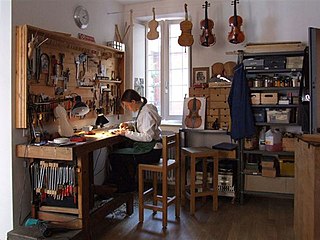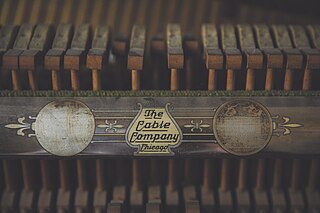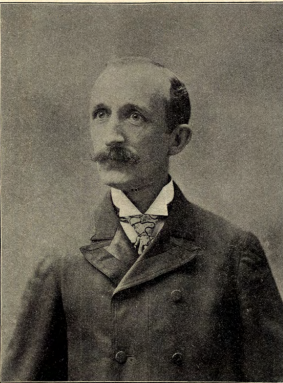
Lyon & Healy Harps, Inc. is an American musical instrument manufacturer based in Chicago, Illinois and is a subsidiary of Salvi Harps. Today best known for concert harps, the company's Chicago headquarters and manufacturing facility contains a showroom and concert hall. George W. Lyon and Patrick J. Healy began the company in 1864 as a sheet music shop. By the end of the 19th century, they manufactured a wide range of musical instruments—including not only harps, but pianos, guitars, mandolins, banjos, ukuleles and various brass and other percussion instruments.

A clef is a musical symbol used to indicate which notes are represented by the lines and spaces on a musical staff. Placing a clef on a staff assigns a particular pitch to one of the five lines or four spaces, which defines the pitches on the remaining lines and spaces.

C.F. Martin & Company is an American guitar manufacturer established in 1833 by Christian Frederick Martin. It is highly respected for its acoustic guitars and is a leading manufacturer of flat top guitars and ukuleles. The company has also made mandolins and tiples, as well as several models of electric guitars and electric basses, although none of these other instruments are still in production.

A luthier is a craftsperson who builds or repairs string instruments.

Squier is an American brand of electric guitars owned by Fender. The former manufacturing company, established as "V. C. Squier Company" was founded in 1890 by Victor Carroll Squier in Battle Creek, Michigan, producing strings for violins, banjos, and guitars. In 1965, the company was acquired by Fender.
Washburn Guitars is an American brand and importer of guitars, mandolins, and other string instruments, originally established in 1883 in Chicago, Illinois. The Washburn name is controlled by U.S. Music Corp., a subsidiary of Canadian corporate group Exertis|JAM.

Henry S. Thompson was an American songwriter of the mid-nineteenth century.

The Vega Company was a musical instrument manufacturer that started operations in Boston, Massachusetts, in 1881. The company began under Swedish-born Julius Nelson, his brother Carl, and a group of associates that included John Pahn and John Swenson. The founders had previously worked for a guitar shop run by Pehr Anderberg that made instruments for John C. Haynes, another Boston musical instrument company. Nelson had served as foreman of guitar and mandolin manufacturing at Anderberg's shop. Subsequently, Julius and Carl Nelson bought out the other founding associates and established the Vega company.

The Elias Howe Company was a 19th and early 20th century musical firm located in Boston, USA and founded by Elias Howe, Jr. (1820–1895). His company was successful, selling more than a million copies of his music instruction books by 1892. Howe was cousin to the inventor of the sewing machine and related to Julia Ward Howe, composer of The Battle Hymn of the Republic.

The C melody saxophone, also known as the C tenor saxophone, is a saxophone pitched in the key of C one whole tone above the common B-flat tenor saxophone. The C melody was part of the series of saxophones pitched in C and F intended by the instrument's inventor, Adolphe Sax, for orchestral use. The instrument enjoyed popularity in the early 1900s, perhaps most prominently used by Rudy Wiedoeft and Frankie Trumbauer, but is now uncommon.

Firth, Pond & Company was an American music company that published sheet music and distributed musical instruments in the 19th and early 20th centuries. The company began in 1847 when William Hall broke with partners John Firth and Sylvanus Pond, thus disbanding their New York-based publishing company, Firth & Hall.

The Old Corner Bookstore is a historic commercial building located at 283 Washington Street at the corner of School Street in the historic core of Boston, Massachusetts. It was built in 1718 as a residence and apothecary shop, and first became a bookstore in 1828. The building is a designated site on Boston's Freedom Trail, Literary Trail, and Women's Heritage Trail.

The dreadnought is a type of acoustic guitar body developed by American guitar manufacturer C.F. Martin & Company. The style, since copied by other guitar manufacturers, has become the most common for acoustic guitars.

Oliver Ditson was an American businessman and founder of Oliver Ditson and Company, one of the major music publishing houses of the late 19th century.
The Boston Brigade Band was a brass and reed band that performed in Boston, Massachusetts, and elsewhere in New England. Some of the musical pieces played by the band were subsequently published as sheet music, including "The Mammoth Cod Quickstep" of 1839. The band received acclaim in its day, particularly for its combination of both brass and woodwind instruments.
Wintter Haynes Watts was an American composer of art songs.

The Cable Company was an American manufacturer and distributor of pianos and reed organs that operated independently from 1880 to 1936.

Florence Atherton Spalding was an American music teacher and a composer from Boston, Massachusetts.

Theodore Bendix or Theo. Bendix was an American composer, classical violinist, musical director, and opera conductor. He became a professional musician at the age of thirteen and was hired as a conductor for an opera company when he was sixteen. Before he was eighteen, he had written the music for the show, resulting in the hit song "My Sweetheart".
















